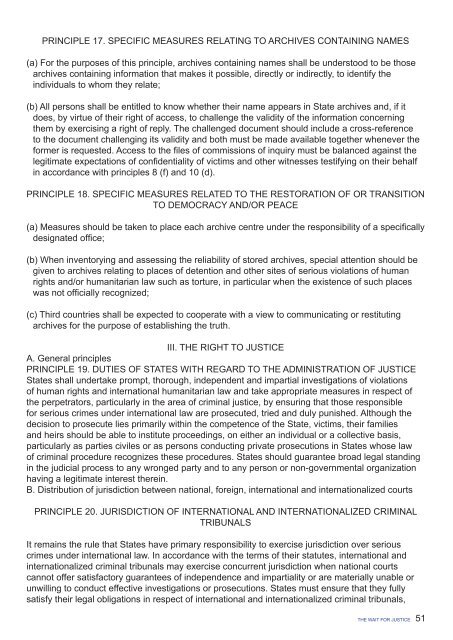The Commissioners of LLRC
The Commissioners of LLRC
The Commissioners of LLRC
You also want an ePaper? Increase the reach of your titles
YUMPU automatically turns print PDFs into web optimized ePapers that Google loves.
PRINCIPLE 17. SPECIFIC MEASURES RELATING TO ARCHIVES CONTAINING NAMES<br />
(a) For the purposes <strong>of</strong> this principle, archives containing names shall be understood to be those<br />
archives containing information that makes it possible, directly or indirectly, to identify the<br />
individuals to whom they relate;<br />
(b) All persons shall be entitled to know whether their name appears in State archives and, if it<br />
does, by virtue <strong>of</strong> their right <strong>of</strong> access, to challenge the validity <strong>of</strong> the information concerning<br />
them by exercising a right <strong>of</strong> reply. <strong>The</strong> challenged document should include a cross-reference<br />
to the document challenging its validity and both must be made available together whenever the<br />
former is requested. Access to the files <strong>of</strong> commissions <strong>of</strong> inquiry must be balanced against the<br />
legitimate expectations <strong>of</strong> confidentiality <strong>of</strong> victims and other witnesses testifying on their behalf<br />
in accordance with principles 8 (f) and 10 (d).<br />
PRINCIPLE 18. SPECIFIC MEASURES RELATED TO THE RESTORATION OF OR TRANSITION<br />
TO DEMOCRACY AND/OR PEACE<br />
(a) Measures should be taken to place each archive centre under the responsibility <strong>of</strong> a specifically<br />
designated <strong>of</strong>fice;<br />
(b) When inventorying and assessing the reliability <strong>of</strong> stored archives, special attention should be<br />
given to archives relating to places <strong>of</strong> detention and other sites <strong>of</strong> serious violations <strong>of</strong> human<br />
rights and/or humanitarian law such as torture, in particular when the existence <strong>of</strong> such places<br />
was not <strong>of</strong>ficially recognized;<br />
(c) Third countries shall be expected to cooperate with a view to communicating or restituting<br />
archives for the purpose <strong>of</strong> establishing the truth.<br />
III. THE RIGHT TO JUSTICE<br />
A. General principles<br />
PRINCIPLE 19. DUTIES OF STATES WITH REGARD TO THE ADMINISTRATION OF JUSTICE<br />
States shall undertake prompt, thorough, independent and impartial investigations <strong>of</strong> violations<br />
<strong>of</strong> human rights and international humanitarian law and take appropriate measures in respect <strong>of</strong><br />
the perpetrators, particularly in the area <strong>of</strong> criminal justice, by ensuring that those responsible<br />
for serious crimes under international law are prosecuted, tried and duly punished. Although the<br />
decision to prosecute lies primarily within the competence <strong>of</strong> the State, victims, their families<br />
and heirs should be able to institute proceedings, on either an individual or a collective basis,<br />
particularly as parties civiles or as persons conducting private prosecutions in States whose law<br />
<strong>of</strong> criminal procedure recognizes these procedures. States should guarantee broad legal standing<br />
in the judicial process to any wronged party and to any person or non-governmental organization<br />
having a legitimate interest therein.<br />
B. Distribution <strong>of</strong> jurisdiction between national, foreign, international and internationalized courts<br />
PRINCIPLE 20. JURISDICTION OF INTERNATIONAL AND INTERNATIONALIZED CRIMINAL<br />
TRIBUNALS<br />
It remains the rule that States have primary responsibility to exercise jurisdiction over serious<br />
crimes under international law. In accordance with the terms <strong>of</strong> their statutes, international and<br />
internationalized criminal tribunals may exercise concurrent jurisdiction when national courts<br />
cannot <strong>of</strong>fer satisfactory guarantees <strong>of</strong> independence and impartiality or are materially unable or<br />
unwilling to conduct effective investigations or prosecutions. States must ensure that they fully<br />
satisfy their legal obligations in respect <strong>of</strong> international and internationalized criminal tribunals,<br />
THE WAIT FOR JUSTICE 51


